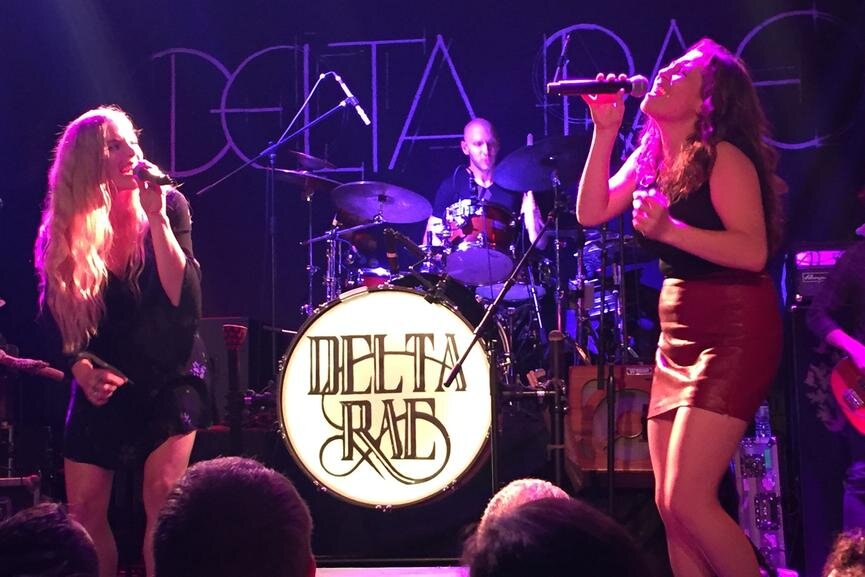As a music fan, it was difficult to stay laid back at the Laid Back Festival in New Jersey. Even without the not-so-surprising walk-on appearance by Bruce Springsteen, the festival lifted the crowd and sent them into orbit during some of the most memorable collaborations of the year.
It started with Steven Van Zandt and his sideband the Disciples of Soul. To watch Little Stevie lead his 16 member group that, sorry fellow BruceBuds, rivals if not surpasses the E Street Band's power, was truly amazing. Starting with The Breakers' "Soulfire" to Southside Johnny & The Asbury Jukes' "Love on the Wrong Side of Town" to The Allman Brothers Band's "It's Not My Cross to Bear", Van Zandt powered through a setlist that, if he was the only act of the night, would have been satisfying enough.
But 11 songs in, Van Zandt invited back former J. Geils Band member Peter Wolf who had already played an exciting and energetic set of his own. In the first two beats of "Freeze Frame", Wolf was bouncing on stage, slapping Stevie's hand, playing a drum roll, clapping, dancing, and tossing his jacket onto the ground.
Afterwards, it was Wolf who paid tribute to Van Zandt. "Rock 'n Roll is like a religion and every religion needs its minister, needs someone to protect it and we have it right here, Little Stevie and the Minister of Rock 'n Roll." No sooner had Wolf left the stage, than the crowd erupted at the sight of Bruce Springsteen, appearing with his guitar, looking casual and relaxed, and standing next to Stevie who together launched into the Southside's "It's Been A Long Time".
Honestly, one song with Bruce would have been enough on this night. After all, he's busy rehearsing for his Broadway debut starting in a few weeks. But the crowd frenzy continued as he and Stevie transitioned to the fun-filled, sing-a-long "Tenth Avenue Freeze-Out". Maybe Bruce was so excited being back on stage with his friend or the fact that he was now standing in the unfamiliar stage-right to Stevie, that he jumped the gun and started singing just as the horns launched into their familiar anthem. Without missing a beat, Bruce made up for his mistake, reset, and instructed the band "let me hear it one more time."
Festival shows force musicians to truncate their set lists but on this night it felt as if Jackson Browne had put on a full show. Browne had picked up the torch for the three year old Laid Back Festival from his good friend and festival co-founder, the late-Gregg Allman who passed away just four months ago. Jackson opened on a nostalgic note with "You Love The Thunder", the song off of his album "Running On Empty", which he recorded at this venue 40 years ago almost to the day, before naming rights turned the Garden State Arts Center into the PNC Bank Arts Center. Browne mixed in his hits with a beautiful tribute to Allman and The Allman Brothers Band with "Melissa".
Honoring one another was a recurring and powerful theme for the musicians on this night. As Jackson brought out Van Zandt, he told the crowd that Little Stevie gave him this next song "I Am A Patriot" when he "really needed it." Given the polarization in the United States today, the song's message, that dissent doesn't mean disloyalty, rings true as much today as it did 28 years ago when Jackson covered it on his album "World in Motion".
The night was complete, right? Wrong. As the concert curfew was setting in, Jackson brought back Springsteen to the chants of "Bruuuuce". "This is a song I learned off the radio, then I learned it again, I learned it several times. I also learned it one time when I heard Bruce sing it. Though I wrote this song, I wrote it with Glenn Frey so it was a while before I learned to sing it. This is for Glenn, this is for Gregg." And then after the opening guitar lick, Jackson welcomed the crowd into "Take It Easy" with a fun-loving "you're gonna sing it too, right?"
It's a song both Jackson and Bruce performed soon after Frey passed away at the start of 2016. On this night, it was more festival especially when Jackson's lead guitarist Val McCallum and lap steel specialist Greg Leisz clearly impressed Bruce by showing off their stuff and alternating guitar solos with Bruce (starting at 4:50 mark of the following video).
Everyone of these musicians continue to challenge themselves, put their work before us, and hit the road at a time in their lives we would grudgingly forgive them if they slowed down a bit. But they're working overtime, literally. After Bruce watched in amazement as Jackson and his band flowed from "Take It Easy" into their classic "Our Lady of the Well", Browne acknowledged the festival ran long, 25 minutes long. In many venues, this would be impossible. But on this night, Jackson thanked the crowd, his fellow musicians, and the union who allowed the show to finish with a flourish. Not that anyone in Jersey was going to cut the power with Bruce on stage.









